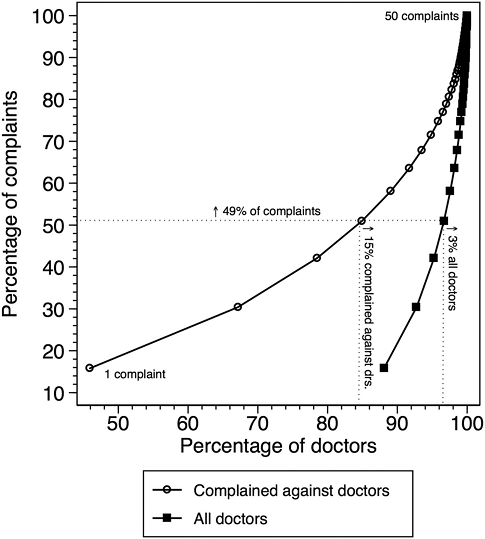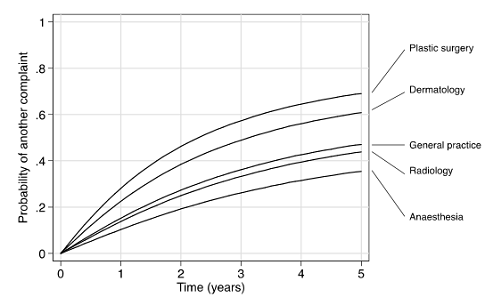3% of doctors receive half the complaints
SOME DOCTORS GET COMPLAINED ABOUT MORE THAN OTHERS. SPECIALTY MATTERS.
One topic in medical decision making that most people can relate to is the problem of choosing a doctor, especially when moving to a new town in which one knows few people from whom to receive references. One way to look at the problem is choosing a doctor you will likely not want to complain about. The likelihood of a doctor getting complaints is somewhat predictable, as shown in this recent article in BMJ Quality and Safety, based on a sample of almost 19,000 complaints filed by patients in Australia.
ABSTRACT
Objectives (1) To determine the distribution of formal patient complaints across Australia’s medical workforce and (2) to identify characteristics of doctors at high risk of incurring recurrent complaints.
Methods We assembled a national sample of all 18 907 formal patient complaints filed against doctors with health service ombudsmen (‘Commissions’) in Australia over an 11-year period. We analysed the distribution of complaints among practicing doctors. We then used recurrent-event survival analysis to identify characteristics of doctors at high risk of recurrent complaints, and to estimate each individual doctor’s risk of incurring future complaints.
Results The distribution of complaints among doctors was highly skewed: 3% of Australia’s medical workforce accounted for 49% of complaints and 1% accounted for a quarter of complaints. Short-term risks of recurrence varied significantly among doctors: there was a strong dose-response relationship with number of previous complaints and significant differences by doctor specialty and sex. At the practitioner level, risks varied widely, from doctors with <10% risk of further complaints within 2 years to doctors with >80% risk.
Conclusions A small group of doctors accounts for half of all patient complaints lodged with Australian Commissions. It is feasible to predict which doctors are at high risk of incurring more complaints in the near future. Widespread use of this approach to identify high-risk doctors and target quality improvement efforts coupled with effective interventions, could help reduce adverse events and patient dissatisfaction in health systems.
Before jumping to the conclusion that there good and bad apples in the world, realize that things that have little to do with the doctor, such as specialty, play a role:
That is, regardless of the doctor, those seeking plastic surgery are much more likely to file complaints than others.
Interestingly, experience doesn’t seem to help. In fact, doctors under 35 are significantly less likely to generate complaints than those age 36 and over.
REFERENCE
M. M. Bismark, M. J. Spittal, L. C. Gurrin, M. Ward, D. M. Studdert. Identification of doctors at risk of recurrent complaints: a national study of healthcare complaints in Australia. BMJ Quality & Safety, 2013; DOI: 10.1136/bmjqs-2012-001691



